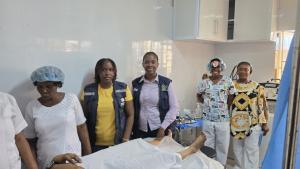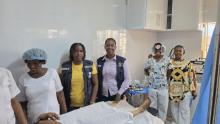Sierra Leone achieves nationwide coverage for cervical cancer screening and treatment
Freetown—Sierra Leone has reached a significant milestone in its efforts to eliminate cervical cancer, achieving 100% district coverage for screening and treatment services. This progress is driven by the Ministry of Health (MoH) with support from WHO, Friends of Africa, UNFPA and other partners in line with the National Policy and Strategy for Cervical Cancer Elimination, which envisions the implementation of a “see-and-treat” approach in every district to ensure access and equitable distribution of screening and treatment services for cervical precancer across the country.
Anchored in a person-centred, life-course approach, cervical cancer services are now integrated into routine primary health care across the country. This achievement reflects the Government’s commitment to delivering an essential health service package that meets the needs of women and girls at every stage of life.
Building on the success of the 2022 HPV vaccination campaign, which reached 187,000 girls, Sierra Leone today launched a 7-day nationwide HPV vaccination campaign from 17–23 November 2025. The campaign aims to vaccinate about 1,000,000 girls aged 11–18, while continuing routine vaccination for 10-year-olds.
Since 2022, the country has expanded cervical cancer screening from 4 districts to all 16, achieving 100% district coverage in November 2025. Today, 25 screening centres are operational nationwide. More than 33,000 women aged 25-49 years have been screened using Visual Inspection with Acetic Acid (VIA), with an average positivity rate of 7%. Among women diagnosed with precancerous lesions, 79% received same-day treatment through Thermal Ablation or LEEP, significantly reducing their risk of progressing to cervical cancer.
Over the next three years, the Government and partners plan to expand access to cervical cancer services across the remaining 27 hospitals and more than 300 primary health care facilities, strengthening integration within the primary care system and advancing progress toward national elimination targets. In addition, there are plans to introduce and scale HPV DNA testing as the primary screening method in line with WHO recommendations.
Beyond routine services, Sierra Leone is building a full continuum of care for women diagnosed with early-stage disease. Through South-South collaboration and strong partnerships with organizations such as Friends of Africa, the country has hosted two surgical camps, providing life-saving procedures that were previously unavailable domestically. These interventions have reduced the need for overseas referrals, helping women avoid significant out-of-pocket costs and access treatment closer to home.
The surgical camps also strengthen national capacity by training and mentoring local clinicians. A third surgical camp is currently underway, further reinforcing the treatment pillar of the national Cervical Cancer Elimination Initiative.
With continued local investment and the support of donors including Gavi, Unitaid, the Government of China and Iceland, Sierra Leone is accelerating progress toward the elimination targets. Implementing the Cervical Cancer Elimination Strategy is not only about improving access to prevention, screening, and treatment, but also about building a more resilient health system and transforming the futures of women and girls across the country.

